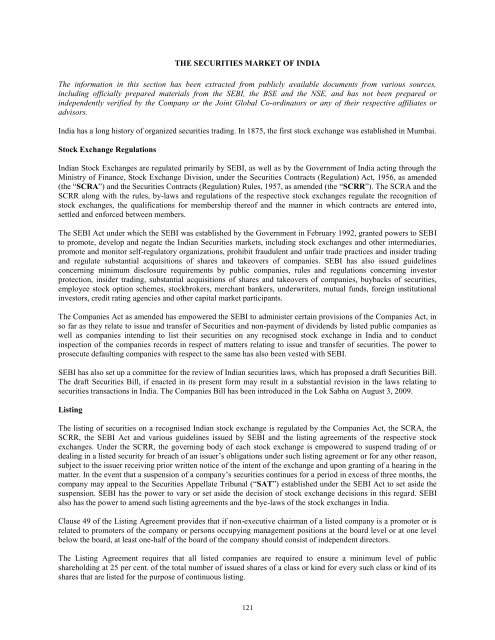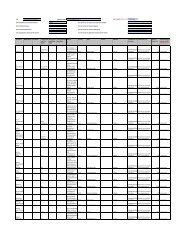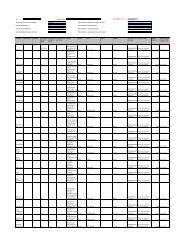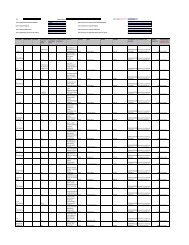GAMMON INDIA LIMITED
GAMMON INDIA LIMITED
GAMMON INDIA LIMITED
You also want an ePaper? Increase the reach of your titles
YUMPU automatically turns print PDFs into web optimized ePapers that Google loves.
THE SECURITIES MARKET OF <strong>INDIA</strong><br />
The information in this section has been extracted from publicly available documents from various sources,<br />
including officially prepared materials from the SEBI, the BSE and the NSE, and has not been prepared or<br />
independently verified by the Company or the Joint Global Co-ordinators or any of their respective affiliates or<br />
advisors.<br />
India has a long history of organized securities trading. In 1875, the first stock exchange was established in Mumbai.<br />
Stock Exchange Regulations<br />
Indian Stock Exchanges are regulated primarily by SEBI, as well as by the Government of India acting through the<br />
Ministry of Finance, Stock Exchange Division, under the Securities Contracts (Regulation) Act, 1956, as amended<br />
(the ―SCRA‖) and the Securities Contracts (Regulation) Rules, 1957, as amended (the ―SCRR‖). The SCRA and the<br />
SCRR along with the rules, by-laws and regulations of the respective stock exchanges regulate the recognition of<br />
stock exchanges, the qualifications for membership thereof and the manner in which contracts are entered into,<br />
settled and enforced between members.<br />
The SEBI Act under which the SEBI was established by the Government in February 1992, granted powers to SEBI<br />
to promote, develop and negate the Indian Securities markets, including stock exchanges and other intermediaries,<br />
promote and monitor self-regulatory organizations, prohibit fraudulent and unfair trade practices and insider trading<br />
and regulate substantial acquisitions of shares and takeovers of companies. SEBI has also issued guidelines<br />
concerning minimum disclosure requirements by public companies, rules and regulations concerning investor<br />
protection, insider trading, substantial acquisitions of shares and takeovers of companies, buybacks of securities,<br />
employee stock option schemes, stockbrokers, merchant bankers, underwriters, mutual funds, foreign institutional<br />
investors, credit rating agencies and other capital market participants.<br />
The Companies Act as amended has empowered the SEBI to administer certain provisions of the Companies Act, in<br />
so far as they relate to issue and transfer of Securities and non-payment of dividends by listed public companies as<br />
well as companies intending to list their securities on any recognised stock exchange in India and to conduct<br />
inspection of the companies records in respect of matters relating to issue and transfer of securities. The power to<br />
prosecute defaulting companies with respect to the same has also been vested with SEBI.<br />
SEBI has also set up a committee for the review of Indian securities laws, which has proposed a draft Securities Bill.<br />
The draft Securities Bill, if enacted in its present form may result in a substantial revision in the laws relating to<br />
securities transactions in India. The Companies Bill has been introduced in the Lok Sabha on August 3, 2009.<br />
Listing<br />
The listing of securities on a recognised Indian stock exchange is regulated by the Companies Act, the SCRA, the<br />
SCRR, the SEBI Act and various guidelines issued by SEBI and the listing agreements of the respective stock<br />
exchanges. Under the SCRR, the governing body of each stock exchange is empowered to suspend trading of or<br />
dealing in a listed security for breach of an issuer‘s obligations under such listing agreement or for any other reason,<br />
subject to the issuer receiving prior written notice of the intent of the exchange and upon granting of a hearing in the<br />
matter. In the event that a suspension of a company‘s securities continues for a period in excess of three months, the<br />
company may appeal to the Securities Appellate Tribunal (―SAT‖) established under the SEBI Act to set aside the<br />
suspension. SEBI has the power to vary or set aside the decision of stock exchange decisions in this regard. SEBI<br />
also has the power to amend such listing agreements and the bye-laws of the stock exchanges in India.<br />
Clause 49 of the Listing Agreement provides that if non-executive chairman of a listed company is a promoter or is<br />
related to promoters of the company or persons occupying management positions at the board level or at one level<br />
below the board, at least one-half of the board of the company should consist of independent directors.<br />
The Listing Agreement requires that all listed companies are required to ensure a minimum level of public<br />
shareholding at 25 per cent. of the total number of issued shares of a class or kind for every such class or kind of its<br />
shares that are listed for the purpose of continuous listing.<br />
121
















